Human Resources
Diversity-Related Targets
Meiji Group 2026 Medium-Term Management Plan
- Data target range or company leading initiatives
- 1-11: Meiji Holdings Co., Ltd., Meiji Co., Ltd., Meiji Seika Pharma Co., Ltd. and KM Biologics Co., Ltd.
- 12: Domestic consolidated subsidaries
| Major initiatives | Metrics | Results / progress | Targets | |
|---|---|---|---|---|
| FYE March 2025 | FYE March 2027 | |||
| 1 | Define ideal global business human resources and conducted human resource training program to promote skill and capability improvement | Sufficient human resources with skills and capabilities that can be utilized in global business (Percentage of employees achieving a certain score or higher in internal assessments, Scope: Managers and career track employees ) | 29.1% | 35% or more |
| 2 | Accelerate selection of human resources to lead next generation of Group management, conducted training program | Number of human resources pool for important positions in group management | 20 people | 30 or more people |
| 3 | Foster autonomous career development awareness and established human resource development system | Participation rate for internal voluntary training | 23.3% | 25% or more |
| 4 | Strengthen management skills of managers to provide career support and foster awareness among female employees, and to promote the utilization of diverse human resources | Ratio of women among executive officers | 2.2% | 5% or more |
| Ratio of women in management positions | 7.7% | 12% or more | ||
| 5 | Proactive hiring of mid-career human resources, promotion of on-boarding, and strengthened links to and hiring of alumni | Ratio of mid-career personnel in managerial positions | 10.9% | 20% or more (FYE March 2041 target) |
| 6 | Strengthen human resource exchanges with overseas Group companies, established hiring scheme for overseas human resources | Ratio of foreign personnel in managerial positions | N/D | 20% or more (FYE March 2041 target) |
| 7 | Establish human resources system for promoting maternity leave among male employees, and foster awareness among male employees and in the workplace | Ratio of men taking childcare leave | 100% | 100% |
| 8 | Create a workplace environment that is comfortable for all | Ratio of establishments with multipurpose toilets and private changing rooms | Toilets: 64.5% Changing rooms: 12.9% |
100% |
| 9 | Implement policies related to improving lifestyle habits, the early discovery of illness, and mental health measures | Absenteeism | 0.6% | 0.3% or less |
| Presenteeism (loss) | 24.2% | 15% or less | ||
| 10 | Implemented policies related to promoting dietary improvements and adopting exercise habits, and prohibiting smoking | Percentage of employees maintaining appropriate weight (FY2023 results: 65.4%) | 64.6% | Yearly improvements |
| 11 | Promoting smart-working for workstyle reforms, reviewed workflows at each workplace | Annual paid leave utilization rate | 77.1% | 80% or more |
| 12 | Fostered awareness through safety education, strengthened facility safety | Number of serious labor accidents | 0 cases | 0 cases |
Promotion of Human Capital Strategy
Human resources are an extremely important capital that supports the Meiji Group's value creation. Respecting employee diversity and enabling individuals to perform to the best of their abilities will lead to the Group's sustainable growth. In line with our management strategy, we will make strategic investments toward developing human resources capable of creating and deploying "Meiji unique value for wellness" globally.
Concept of Human Capital Strategy
Under the 2026 Medium-Term Business Plan, we will work on evolving Meiji ROESG® management, transforming our markets, businesses, and behaviors to restore growth potential. Through global expansion of our business and fusion of sustainability and business strategies by addressing social issues, we will enhance our competitive advantage and maximize the Meiji Group's value, thereby achieving sustainable growth. Based on this management strategy, we formulated Our Value Creation Story within our human capital strategy, as a further embodiment of connections between our Group Philosophy and management strategy and our human capital strategy. The aim is to clearly define our ideal human resources and organizational culture, so that diverse human resources can continuously be autonomous, take on challenges, grow, and co-create, thereby generating innovation. To realize this human capital strategy, we will implement the development of human resources and working environments for competing globally, promote human capital sustainability, and improve the effectiveness of Group HR functions.
Our Value Creation Story

Ideal Human Resources
In Our Value Creation Story, we define ideal human resources as "professional human resources who will continue to grow and take on challenges while leading the world in food and wellness." To achieve this, we have identified five key aspects: challenging spirit and autonomy, relationship-building skills, expertise, integrity and ethical standards, and high-level perspective and broad outlook. Additionally, as foundational improvements supporting human resources and organizational culture, we have clearly defined our ideal with respect to DE&I (Diversity, Equity and Inclusion) and wellness, and based on these definitions, we are developing various measures.
New HR (Human Resources) System
For the Meiji Group to achieve sustainable growth, it is important to create a working environment where each of our employees—responsible for realizing this growth—can continue to take on challenges and grow with a high degree of motivation, and can continually demonstrate their capabilities. Based on this thinking, we introduced a new HR system in April 2025. The new system aims to encourage highly motivated human resources to thrive through the appointment of the right person to the right position and the realization of promotions and selections regardless of age. It will serve as a common Group-wide foundation, enabling diverse human resources to be autonomous, take on challenges, grow, co-create, and generate innovation, with the aim of enhancing corporate value.
Specifically, we have established a fair and reasonable evaluation system that bases grading on job duties and roles, and assesses performance based on generated results and demonstrated actions. The new HR system also includes a well-balanced and externally competitive compensation system designed to reward employees for their job duties, responsibilities, and achievements.
Furthermore, in the assessment of actions, which applies particularly to leaders and above, we seek the creation of actions that are mindful of co-creation with stakeholders and society, by incorporating items such as dialogue and co-creation with society, promotion of a challenging spirit, and self-actualization.
Evaluation System for Employee Growth
For employees to achieve high performance, they must develop professional skills, gain enriching work experiences, set challenging work goals, and push themselves to meet those goals. In the evaluation component of our new HR system, we promote and commend the setting of ambitious and challenging goals. We aim to operate the system in a way that leads to employee growth by assessing each individual's results and actions annually on an absolute scale, followed by thorough discussion and adjustment between superiors and team members to ensure high levels of understanding and acceptance.
We also conduct yearly 360-degree evaluations for managers at certain operating companies, using this multifaceted feedback to develop managers.
Meiji Human Capital Impact Path
With respect to the HR strategy, which forms the foundation of Our Value Creation Story, we have established a new Meiji Human Capital Impact Path—a visual representation of the links between our HR strategy and medium- to long-term profit creation. It serves as a concept supporting the strategy, clarifying the relationship between our ultimate goal of enhancing corporate value, the materiality of human capital, and various human capital management measures (inputs).
Specifically, we will monitor KPIs related to various inputs and, through necessary actions, aim to maximize the performance of individual employees (value creation rate) and improve the alignment of vision between employees and the Meiji Group (employee engagement score). By linking these two elements, we aim to create a virtuous cycle, and through the realization of diverse, energetic human resources, we believe this will also lead to the creation of profits in the medium to long term and the enhancement of corporate value.
Meiji Human Capital Impact Path
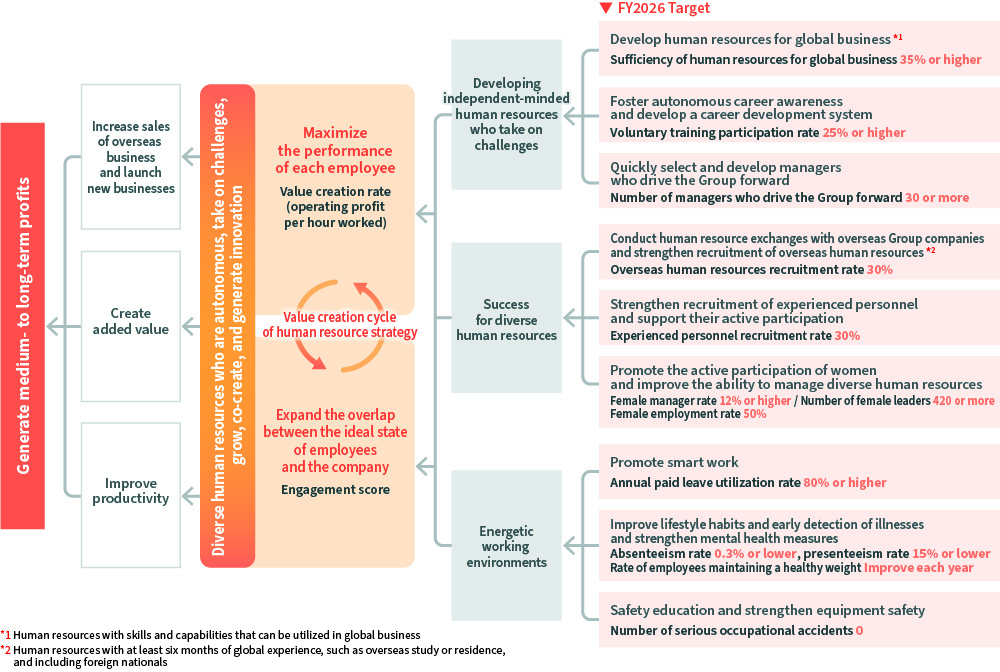
Group Human Capital Committee
The Group Human Capital Committee, chaired by the CEO, meets twice annually as an advisory body to the Executive Committee. We will discuss Diversity, Equity and Inclusion (DE&I), Human Capital Development, Health and Productivity Management, Smart Work, and Occupational Health and Safety. We will then set up KPIs. We will promote the human capital strategy based on management strategy throughout the Group.
Mission of committee
- Enhancing Human Productivity and Value Creation Capabilities
From Human Resources to Human Capital
We view employees as capital, not resources. We will strengthen human productivity and the ability to create value through investments focused on improving quality. - Creating a Culture and Structure Essential for Sustainable Growth
From Human Resource Strategies to Management Strategies
We will consider the ideal state of the Group’s human capital and develop a system where employees perform to the best of their abilities to realize the Meiji Group 2026 Vision. In particular, we will promote a strategy that emphasizes the development of core human capital to lead management strategies.
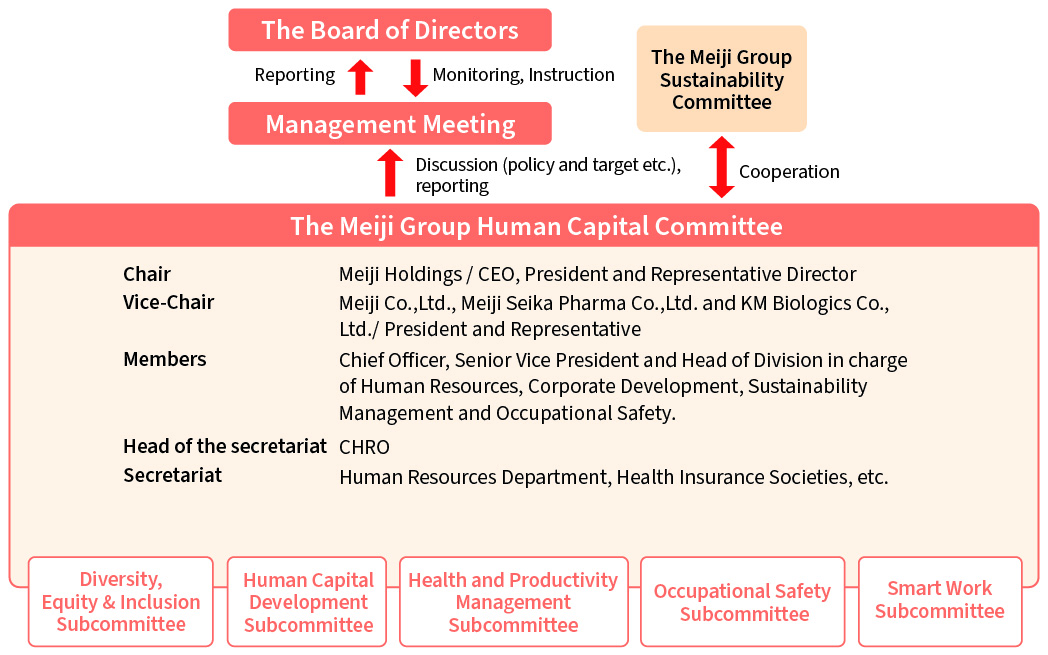
Human Capital Development
We believe that respecting the diversity of organizations and individuals and maximizing the vitality and capabilities of each employee will contribute to the sustainable growth of the Meiji Group, and we are focusing on human resource development.
Meiji Group Human Resources Development Policy
The Meiji Group has created a basic policy concerning skills development, and the company provides a skills development structure to foster human resources.
- Promotion of a challenging spirit and autonomy, and acquisition of leading-edge expertise
- Support for individual growth, career development, and self-actualization
- Cultivation of a high-level perspective and broad outlook, and building of open relationships inside and outside the Group
- Empathy with the corporate vision and Group Philosophy
The Meiji Group is strengthening its investment in human resources based on a human capital strategy linked to its management strategy, aimed at fostering "professional human resources who will continue to grow and take on challenges while leading the world in food and wellness." Specifically, building on Our Value Creation Story, we are revising the Meiji Group Human Resources Development Policy, and at the same time, in order to realize our management strategy, we are discovering and developing human resources to be responsible for future Group management, focusing on themes such as human resources for global business, human resources for management leadership, and human resources for business transformation. We will also advance efforts that facilitate the development of human resources with digital skills as well as the active career development of employees.
Additionally, we are actively engaging in mid-career recruitment to acquire specialized and highly skilled human resources. We are also building leadership pipelines for female managers and providing opportunities for their career development.
Skills Development Structure
Based on the Meiji Group Skills Development Policy, we have established a skill development system that facilitates the growth and career development of each employee.
| New employees | Mid-career employees | Managers | Objectives | |
|---|---|---|---|---|
| Developing next-generation leaders |
|
|
|
|
| Global training Diversity Management Development of DX human resources |
|
|
|
|
| Rank-based training |
|
|
|
|
| Voluntary training Career development |
|
|
||
| Division-specific training and group company training |
|
|
||
Identify and develop human capital for group management
The figure below shows three characteristics of the Group management team: instigating change/strategic human capital, management, and specialists. Our management team should consist of members whose strengths are at least one of the three characteristics.
Of the three characteristics of management human capital, development of “instigating change/strategic human capital” is critical to further strengthening the Group management. If such human capital takes the initiative in developing and implementing progressive strategies, we can compete with external rivals and survive in the future. In FY2021, we launched the Group Management Human Capital Development Program for executive officers and candidates. Through this program, we identify and develop promising individuals who could perform as future managers in the group.
We encourage every individual to bring their strengths and individuality to the job. At the same time, we develop future managers through measures that promote characteristics (leadership values) and growth, which serve as the foundation of succession management.
Required Abilities for Managers who Drive the Meiji Group Forward
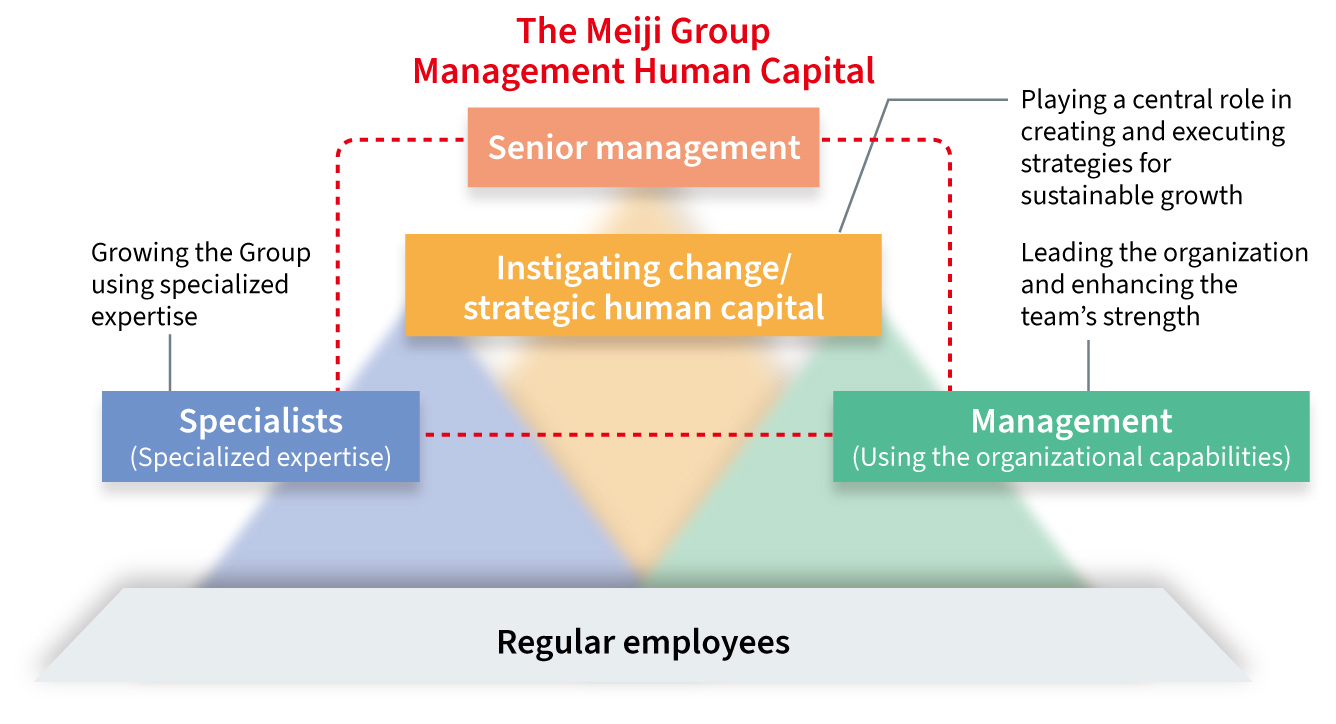
Desired Management Human Resources (Leadership Value)
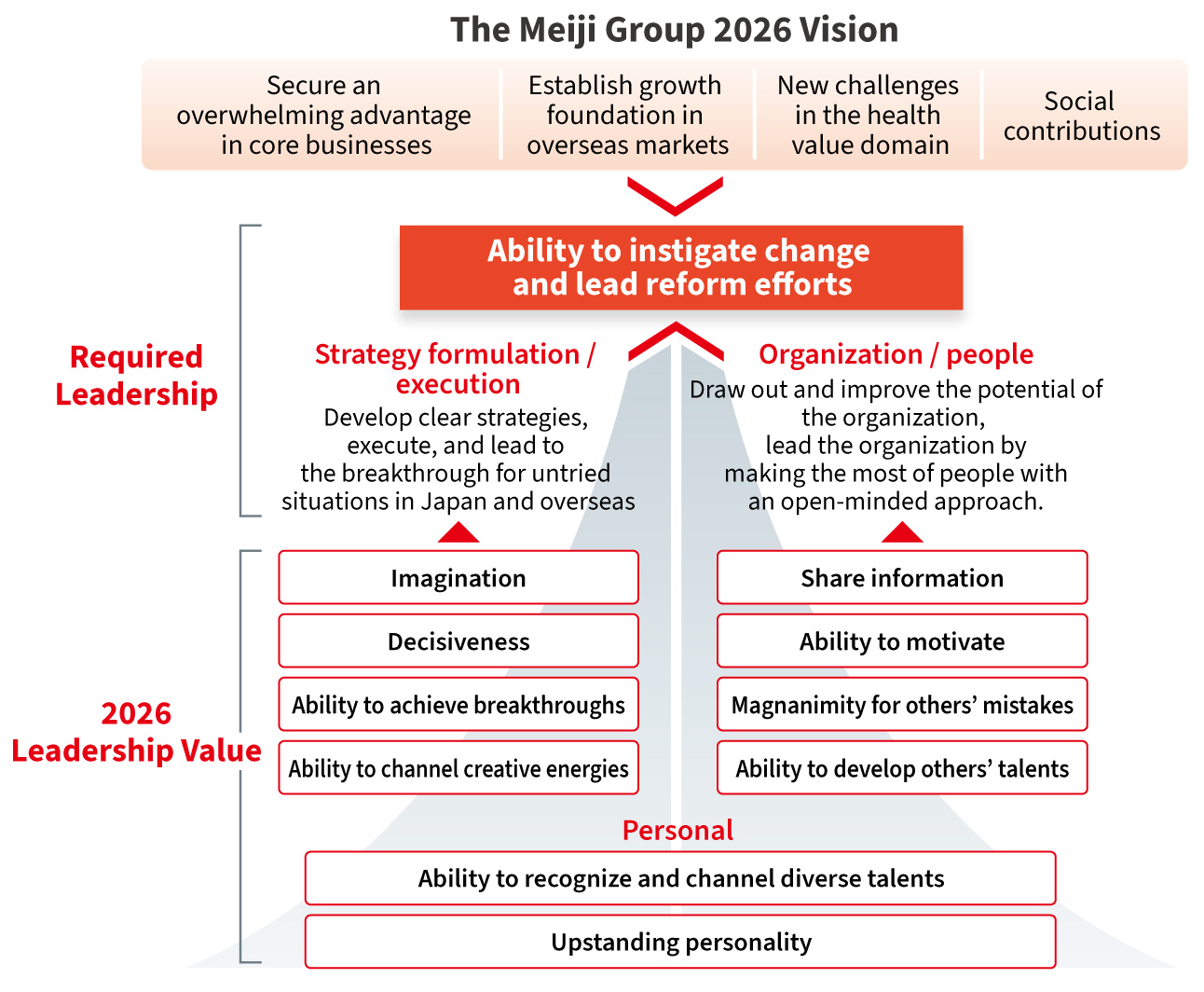
Implementing Group Management Human Resources Development Programs
We are implementing human resources development programs chaired by the CEO for executive officers and candidates. Program content focuses on self-development plans to reaffirm abilities, skills, and competencies, as well as reports to the CEO regarding the individual's self-directed management reform activities. Through these programs, we cultivate perspectives and views as group managers, identifying group manager candidates in the process of transforming mindsets among future corporate reformers.
Nurturing Future Leaders
In addition to in-house training, we send employees to external training programs such as cross-industry exchanges and business schools with the aim of developing human resources with a broad perspective and point of view. We offer a broad range of training programs, from learning the management sense and management leadership skills to acquiring the strategic thinking, reasoning, decision-making, and communication skills needed by the leaders of tomorrow.
Training program for the development of personnel capable of working globally
-
We provide a wide variety of training programs to develop personnel capable of working globally.
- Self-development language courses
- Language training in English- and Chinese-speaking countries for effective language-learning and understanding of different cultures
- Programs sending selected personnel to business language schools to acquire practical language skills
- Programs to instill perseverance, understanding of diversity, and mental toughness by sending personnel overseas to gain first-hand experience in business customs under challenging conditions
Rank-specific training, business skills training at each career stage
Systematic training for Meiji Group employees starts with new-employee training, where employees learn the basic knowledge, behavior, and attitudes they need for work at Meiji. Next, employees receive training in logical thinking, follow-through, team-leadership skills, and the qualities and capabilities of a business leader. Managers receive training at each relevant stage, helping them reflect on their management style and strengthening their ability to foster their subordinates. Training for upper management is designed to enhance management skills to make the workplace more dynamic and to cultivate an awareness of self- reform as participants seek to become management leaders.
Mechanisms to Encourage Autonomy and Challenge
Voluntary Training to Support Career Development
We provide employees having the spirit of taking on challenges with opportunities for self-development on an application basis. We also have a support system in place to help employees develop their own abilities. We will continue to introduce a training system that gives employees more opportunities than ever before to be self-motivated in their training in order to support the growth of employees toward the careers and goals they envision for themselves. We accelerate the development of autonomous human capital by encouraging employee learning autonomy, moving away from corporate-mandated training and toward self-directed training.
| Program Objectives | Number of attendees | Average attendance time(hours) | Average Education and training expense(unit:thousand of yen) | |
|---|---|---|---|---|
| Developing next-generation leaders |
|
146 | 75.6 | 774.0 |
| Global training Diversity management training |
|
1,756 | 12.0 | 8.6 |
| Rank-based training | Acquire skills necessary at each stage:
|
1,184 | 22.2 | 59.8 |
| Voluntary training, self-development, etc. |
|
3,468 | 21.6 | 25.4 |
| Division-specific and group company training |
|
111,031 | 0.7 | 1.9 |
| Group Philosophy training (For new employees) |
|
341 (Percentage of participants to domestic employees: 1.4%) |
3.8 | 41.0 |
Facilitating career planning through self-assessments
As part of our efforts to strengthen talent management, we are implementing an initiative where employees outline their career plans and aspirations on a Career Design Sheet in consultation with their supervisors. The self-assessment reports create opportunities for employees to reconsider their work practices and career paths, and also provide useful information for management to develop necessary training programs and help employees thrive in the workplace.
Diversity, equity and inclusion
People's values are diversifying in both the consumer and labor markets. We should promote DE&I to sustain growth in such an environment. We will accelerate diversity in our core human capital by hiring, development and promoting women, globally experienced personnel , and experienced personnel from outside the company. Also, we will strengthen our competitiveness by creating diverse career options including senior human capital.
Meiji Group Policy on Diversity, Equity & Inclusion
We have established the Meiji Group Policy on Diversity, Equity & Inclusion to promote DE&I toward realizing the Meiji Group 2026 Vision. We will promote DE&I to provide customers in Japan and around the world with progressive values in food and health.
<2050 The Meiji Group's vision of DE&I realized>
The Meiji Group aims to promote diversity, equity and inclusion by setting a 2050 target of achieving a women ratio of 50%, a mid-career hires ratio of 30% or more, and a personnel globally experienced* ratio of 30% or more.
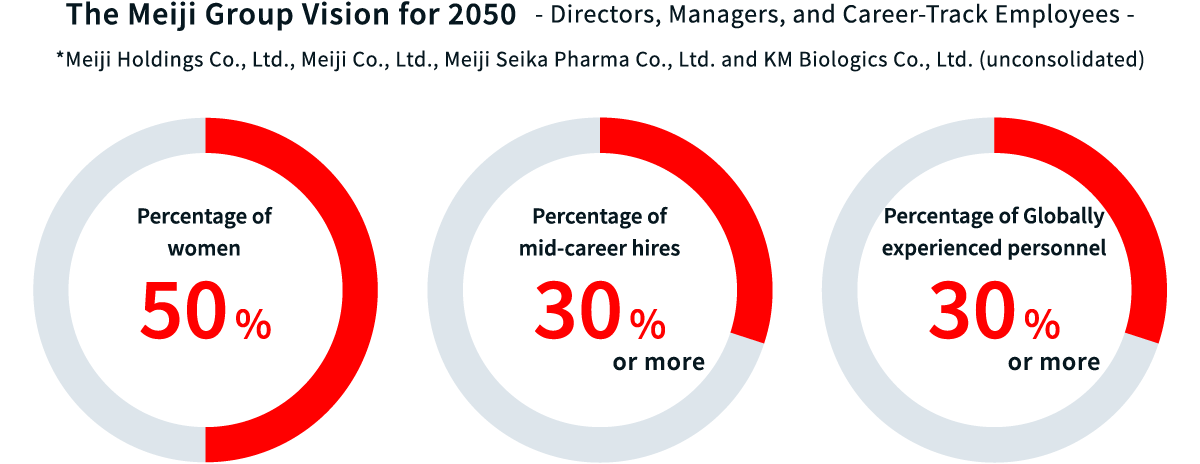
Three Approaches to Promoting DE&I
The Group promotes DE&I through three approaches: creating diversity, leveraging diversity, and expanding diversity. Through these three complementary approaches, we promote DE&I and foster the Group culture.
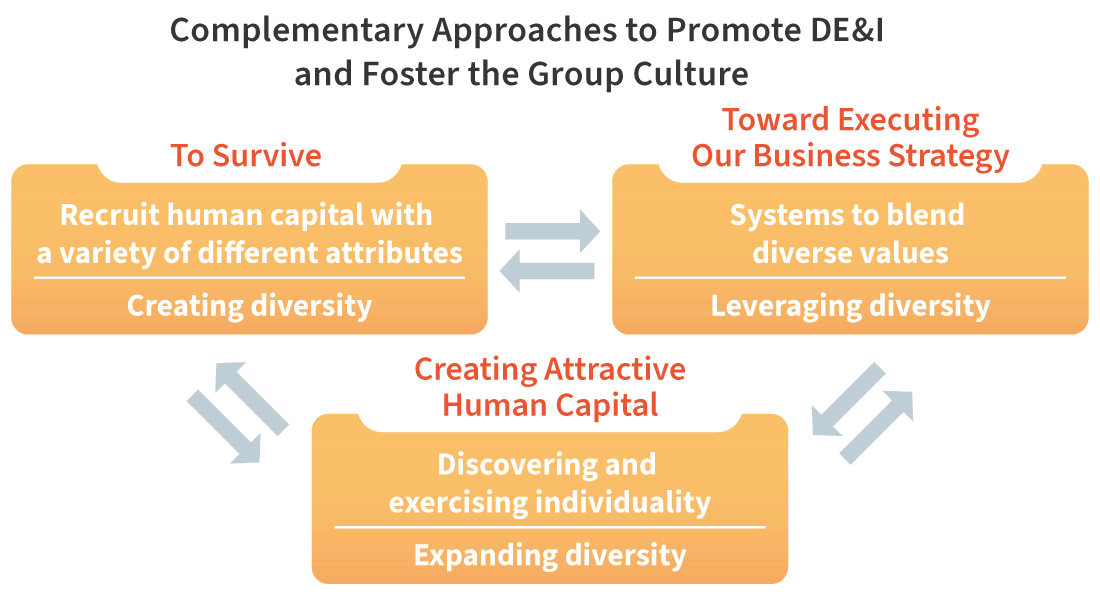
Promoting Female Participation
Our first step toward DE&I is to encourage women to play a more active role in our organization. To this end, senior management has committed to promoting more women to management positions, conducting unconscious bias training and career training for female employees. Further, to create organizations and workplaces in which every employee, regardless of gender, performs to the best of their abilities, we strive to offer more robust support systems that respects work-life balance. We provide regular training for managers who supervise female employees and employees in their child-rearing years, and we communicate throughout the Meiji Group to raise awareness.
- Meiji Holdings Joins 30% Club Japan, a Campaign to Increase the Proportion of Female Corporate Executives
- Meiji Co., Ltd. The company acquired the Two-Star Eruboshi Certification for the first time. The Eruboshi Certification is awarded to companies that seek actively to empower female employees.
- Selected to Next Nadeshiko: Companies Supporting Dual-career and Co-parenting as Outstanding Company for Supporting Work-life Balance
Strengthening the Pipeline of Female Executive Officers and Managers
We are promoting measures to enable female employees to improve their skills and abilities and raise their career awareness so that they can take on challenges with an even broader perspective and point of view without any barriers. As a way of supporting female leaders in improving their careers, we held group training sessions for women who were one step away from management positions where they reported on their themes to the President. In addition, we held group training sessions for female managers where they reported on themes for management reform to the CEO as a way of helping them to gain a Group-wide perspective. As a program for managers, we introduced a mentoring program where executive officers act as mentors to develop the abilities of female managers participating in the program while supporting them with their management and career concerns.
Building a Network of Female Employees
Group Joint Networking Event for Women in Management
Every year in March, we hold a groupwide networking event for women in management in conjunction with International Women’s Day. In FY2024, a total of 50 female managers participated in the event. The initiatives, including roundtable discussions with female executives and group discussions with management divided by job classification, have led to the creation of cross-group networks, and the cultivation of a perspective toward senior management, as well as the creation of a pipeline for management positions.
Training sessions to build a network of female employees
Meiji Co., Ltd. holds training sessions to help each woman work positively and vigorously in her own way through networking among female employees, and to create innovation by utilizing the power of women. The monthly training includes career sharing, seminars on women's specific concerns (such as menstruation and menopause), discussions on how to resolve company issues, and monitoring of new products.
Training for Employees in Their Childcare Years
As a groupwide initiative, we conduct training for employees and their supervisors who are raising children, with the aim of supporting a balance between childcare and work as well as supporting their success in their careers. Employees raising children learned "effective communication skills to involves colleagues," while supervisors learned "the importance of individual management and activity support." In addition, employees with childcare responsibilities and supervisors participated in a workshop to help them understand each other.
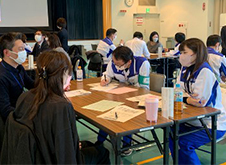
Initiatives for Mid-Career Recruitment
The Meiji Group actively recruits human resources who have built their careers at other companies with a wide range of knowledge, experience, and abilities in order to quickly respond to changes in the external environment and strengthen business development from diverse perspectives.
We are also strengthening our approach to employees who have resigned. We introduced a “come-back system” that enables reemployment in the Meiji Group with the aim of revitalizing the company through the reemployment of members who have diverse experience and knowledge outside the Meiji Group. Furthermore, we plan to establish the “alumni network” as an activity that will allow retired members to maintain contact with the Meiji Group, thereby creating new business opportunities and enhancing brand value. In addition, in FY2024, as an onboarding measure for mid-career hires, we conducted two joint training sessions on Group Philosophy. By sharing the values of Meiji Group employees with colleagues who joined during the same period, the sessions foster a deeper understanding of the Group and facilitate networking.
Active Recruitment of Global Human Resources and Colleagues Working Around the World
With the aim of further expanding its global business, the Meiji Group actively recruits outstanding local human resources at overseas Group companies in order to develop businesses that are suited to local cultures and needs. The Meiji Group believes that hiring local human resources contributes to the sustainable development of each country and region. To encourage locally hired employees to work enthusiastically, and to strengthen collaboration among Group companies, in addition to developing a multilingual web-based in-house magazine, promote human resource exchanges between Japan and overseas, and hold learning workshops. We also actively recruit global human resources* to strengthen awareness of overseas business in Japan and to create an organizational culture in which diverse values are shared. We are building a scheme for recruiting overseas human resources by participating in recruitment events for students studying abroad and strengthening relationships with universities that have many foreign students.
Encouraging male employees to take childcare leave
Our operating companies are a member of the initiative to develop supervisors who support individual careers. In addition, from FY2025, we have raised the maximum number of paid childcare leave days for male employees to 28 days, and will advance initiatives designed to ensure that men are more actively involved in childcare than ever before. We are continuing to encourage male employees to take childcare leave through various approaches, including offering individual counseling to eligible employees and their supervisors, posting examples of employees taking childcare leave on an internal portal site, and providing training for directors and managers. Going forward, we will continue to strive to create a workplace environment that makes the most of the values and skills of our diverse human resources, including the use of childcare leave by male employees.
Promoting Employment of People with Disabilities
The Meiji Group employs people with disabilities at over 40 workplaces across Japan, and aims to maintain its ratio of employees with disabilities above the country's legal requirement of 2.3% for large companies. These workplaces have installed barrier-free restrooms and wheelchair ramps to create comfortable work environments for all employees.
Maintaining accessible workplaces for all members
At the Meiji Group, at the initiative of an employee with a disability, there is a growing movement among workers to display a card on their chest informing them of their disability. These cards can be used by those who wish to use them in accordance with their disabilities, leading to the formation of better communication. In addition, Meiji Co., Ltd. actively promotes the acquisition of qualification of vocational counselor for the disabled, and provides basic knowledge training on disability for all employees. By deepening understanding of disabilities, we are striving to create an environment that is easy for everyone to work in.
Supporting Sexual Minorities in the Workplace
The Meiji Group is undertaking LGBTQ+ initiatives with the aim of enabling diverse human resources to work vibrantly and demonstrate their abilities in their own way. We are committed to promoting understanding among employees and improving the workplace environment.
Specific initiatives
- Promoting understanding of LGBTQ+ issues in each company's human rights training
- Switching the display of restroom for the disabled and multipurpose restroom to the display that can be used regardless of gender
- Establishment of LGBTQ+ consultation service
- Conducting seminars for hiring managers in order to promote understanding of LGBTQ+ issues
- Application of welfare benefits to same-sex partners
- Implemented bottom-up activities through its employee Ally (Alliance) network, which is a group of people who understand and support LGBTQ+
- Product development and marketing that embraces diversity
These efforts of Meiji Co., Ltd., Meiji Seika Pharma Co., Ltd. and KM Biologics Co., Ltd. have led to the highest rating of Gold in PRIDE Indicator for three consecutive years, an evaluation index for LGBTQ+ initiatives in the workplace. Meiji Co., Ltd. has also been awarded the Rainbow Certification for three consecutive years, which recognizes companies that promote collaboration beyond sectors including the national government, local governments, academic institutions, NPOs/NGOs, and other organizations.


Rehiring Employees after Retirement
We have put a program in place to rehire employees after the current retirement age of 60, and to continue employment until the age of 70 in stages. The program allows these employees to not only apply the skills they have acquired over many years but also to guide and mentor younger colleagues.
In addition, Meiji Co., Ltd. implements career development support measures for senior employees (career design training for those in their 50s, career design interviews for those in their 50s, and reskilling) in order to assist individuals in their autonomous career development and ability development, so that seniors can work actively. The company has also introduced a job matching system that allows employees to choose their internal career paths.
Employee-Friendly Workplaces
Promoting Health Management
We strive to improve productivity by grasping the mental and physical health of employees from a managerial perspective and strategically investing in maintaining and promoting such health. As a company embodying the Group slogan “Now ideas for wellness,” we believe it is crucial for our employees to remain healthy and vigorous. To achieve this goal, we have formulated and disclosed the Meiji Group Health Management Strategy Map.
We have selected healthy lifestyle habits (diet, exercise, quit smoking) as key to preventing obesity. We have set KPIs and are promoting measures accordingly.
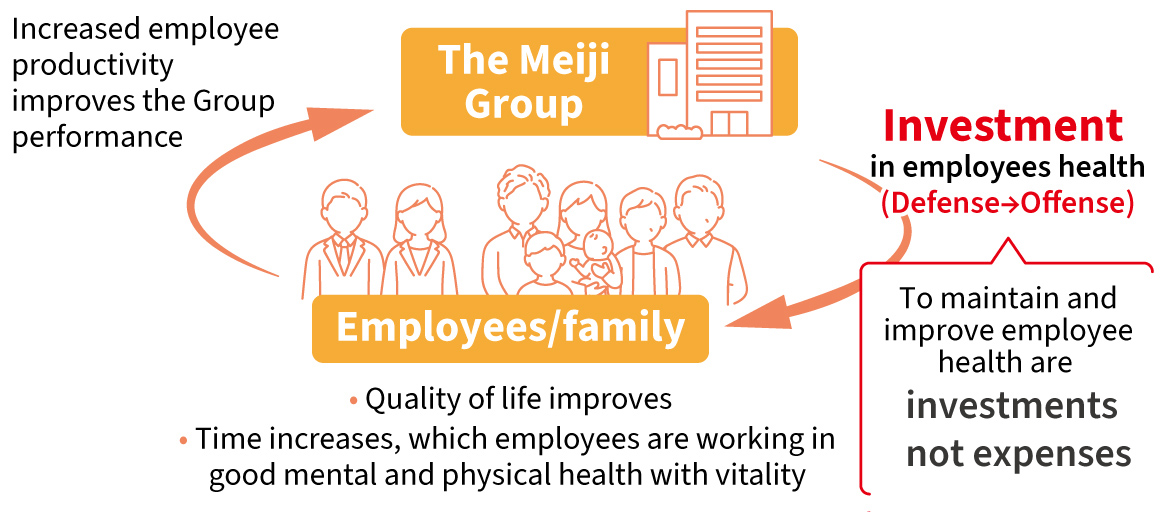
Committed to the Health of Employees
In 2018, the Meiji Group made an official commitment to help employees effectively manage their health and to promote wellbeing in the workplace. This commitment provides the basic principles of the Group's health management systems.
Meiji Group Commitment to the Health of Employees
The Meiji Group recognizes the fundamental importance of good physical and mental health for its employees to lead productive lives and reach their full potential. Therefore, the Group is committed to the following three activities.
- Measures shall be taken to encourage employees to responsibly manage their own health as well as the health of their family members.
- Programs shall be put in place to support the efforts of employees to manage their health and to enhance their ability to do so.
- Steps shall be taken to ensure that workplaces provide comfortable and safe working environments for all of their members.
Health management challenges and goals
We have formulated and are implementing a Health Management Strategy Map that clarifies the link between investing in Health Management and the effectiveness of measures. To address the management issue of realizing a company in which employees can work comfortably and are healthy and energetic in both their mind and body, we are aiming to achieve this goal by improving the lifestyle habits of "meals," "exercise," and "smoking," with the aim of "reducing the number of obese people to prevent lifestyle-related diseases." By using the "Health Management Strategy Map" for internal communication, we will promote understanding and awareness of health management initiatives among employees and their families, in collaboration with industrial health staff, the health insurance association, and employee representatives.
| Approach to Health Issues | Key Targets |
|---|---|
| Absenteeism: 0.3% or less (target for FY2026) Presenteeism (loss) : 15% or less (target for FY2026) |
|
| Strengthen initiatives to reduce lifestyle-related diseases (high-risk individuals) | Percentage of regular health checkups received: 100% |
| Improvement of dietary habits | Increase the ratio of people with healthy eating habits (Support for eating breakfast and reducing the number of people who eat before bedtime) |
| Encouraging Exercise | Increase in the ratio of people who are regular exercisers |
| Early detection of disease | Cancer screening takers: Improved every year Secondary health checkup rate: Improved every year |
| Prevention of Passive Smoking and Encouraging Quit Smoking | Ensure no smoking during working hours Encourage employees to quit smoking and support employees who wish to quit |
Improvement of Dietary Habits Through Nutrition Education Caravan and Breakfast Support
Aiming to improve the percentage of Meiji Group employees with healthy dietary habits, we have been conducting the Nutrition Education Caravan at operating sites nationwide every year since FY2022. The theme for seminars held in FY2023 was techniques for controlling cholesterol and visceral fat. Additionally, since FY2024, as a trial measure aimed at increasing the percentage of employees who eat breakfast, we installed Breakfast Boxes at some operating sites. By developing a system allowing light meals to be received only during breakfast hours, we are promoting the habit of eating breakfast.

Promotion of Good Exercise Habits Through the "Walking Campaign" Workplace Challenge
The Walking Campaign is a program conducted annually to encourage employees to adopt good exercise habits, and in FY2024, it was held in an inter-workplace challenge format. By posting workplace rankings in real time, the campaign was designed to foster increased encouragement and strengthen communication within workplaces. Top-ranked teams are presented prizes and commended for their efforts as a way of strengthening employee motivation to participate.
Initiatives to Prevent Passive Smoking and Encourage Smoking Cessation
We are taking steps to prevent passive smoking and to help employees quit smoking in order to reduce the smoking rate to as close to zero as possible in the future in order to promote employee health and create a workplace environment where people can work with peace of mind. As a first step, we made the zero smoking declaration for executive officers to achieve a zero smoking rate. We also put up posters at each business site with a message from the President calling for employees to quit smoking, which includes his own story of smoking cessation. In order to raise awareness of the need to quit smoking among all employees, letters from the president are sent to the homes of employees who smoke, supporting their efforts to quit, and specifically for general managers, one-on-one interviews are conducted with medical professionals. We are working to maintain and promote the health of employees at each operating site by completely separating smoking and non-smoking during working hours, as well as setting and informing employees of no-smoking day on the 22nd of each month.
Mental Health Initiatives
As part of our efforts to address employee mental health, the Meiji Group conducts stress checks once a year at each of our operating companies. We also have a system in place for employees to meet with an industrial physician, if so desired. In addition to stress checks, we pursue mental health-related initiatives that include self-care training for employees to become aware of their own mental health issues and line-care training for managers who supervise others.
Infection Control Measures
To protect the health and safety of our employees worldwide, we provide expatriates and overseas business travelers with up-to-date information on the outbreak of infectious diseases including malaria, TB and HIV in each country, as well as preliminary guidance and support, including necessary immunizations and the provision of information from local medical institutions. In addition, we are taking all-out measures to prevent infection in the workplace, including the implementation of in-house mass vaccination for all employees in Japan as a countermeasure against seasonal influenza.
Recognized for outstanding health and productivity management
In 2025, Meiji Holdings was recognized for their outstanding health and productivity management for the nine consecutive year through a certification program operated by Japan's Ministry of Economy, Trade and Industry. The program evaluates companies based on their employee health activities, such as provision of regular checkups, healthcare guidance, counselling, and fitness programs.
Also, In 2025, Meiji Holdings was selected as the Health & Productivity Stock Selection Brand by the Ministry of Economy, Trade and Industry and the Tokyo Stock Exchange for three consecutive years.
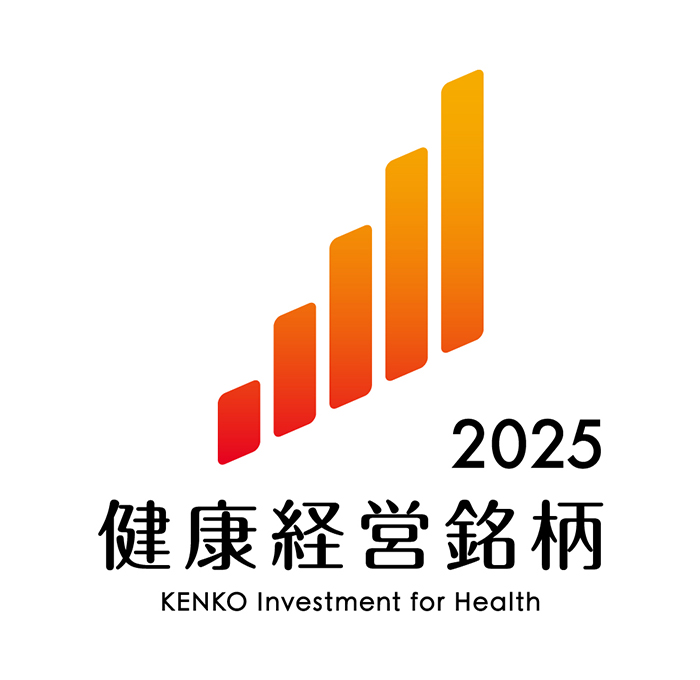

Promoting Smart Work
The Meiji Group has consistently implemented work style reforms, and as a result, working environments as a whole have steadily improved. Meanwhile, it has become clear that common challenges related to "work styles" exist in both DE&I promotion and KENKO Investment for Health, and we recognize that further improvement of working environments is essential.
To achieve a state where "each employee works with high productivity and the potential of individuals and teams is maximized," we are shifting to creative work and promoting "smart work"—a work style where each employee aims to be autonomous, take on challenges, grow, and co-create.
Providing Flexible Work Arrangements
The Meiji Group has introduced telecommuting and flextime systems for employees who need more flexible work arrangements. It also allows employees to continue fulfilling their work responsibilities when dealing with major life events. For example, employees can opt to work shorter work hours following a childbirth, and male employees are encouraged to take paternity leave.
We have created an environment in which employees can maximize their capabilities at their respective life events.
- Introduction of a telecommuting system
- Introduction of a flexible work hours system
- Introduction of a workcation and step out system
- Support for male employees to take childcare leave
- Thorough implementation of employment continuity support system for employees at life events
- Childcare and nursing care programs
| Childcare Nursing care |
Pregnancy leave | From pregnancy to 46 days before childbirth |
|---|---|---|
| Maternity leave | From 45 days before childbirth to 56 days after childbirth | |
| Childcare leave | Mothers can take childcare leave until the child reaches three years of age | |
| Childcare break during work hours | Female employees raising children under the age of one can take two childcare breaks of at least 30 minutes each per day | |
| Shortened work hours for childcare |
|
|
| Nursing care leave (Short term) | 5 days per year per eligible family member | |
| Nursing care leave (Long term) | Total of 365 days per eligible family member | |
| Nursing care: Measures to shorten work hours, etc. | Shortening/staggering of work hours, exemption from overtime/late night work, application of flextime system | |
| Allowances, etc. | Childbirth and childcare support | At the time the employee or spouse gives birth (childbirth gift money and childcare goods) |
| Next generation cultivation allowance | Monthly Allowance for Dependent Children | |
| Mutual aid system | Childbirth gift money, subsidy of 50% of babysitting expense (within 30 days), school entrance gift money, orphans' scholarships, etc. |
Encouraging employees to take paid holidays
Through awareness-raising activities for employees and workplaces, we foster a culture that encourages employees to take annual paid leave and promoting the use of annual paid leave.
- Encourage employees to take consecutive annual paid vacations (five days)
- Establishment of specific days for encouraging employees to take annual paid leave
- Set annual leave schedules at the beginning of the fiscal year and share them throughout the workplace
Initiatives aimed at reducing long working hours and improving productivity
- Thorough reporting and management of appropriate working hours
- Promoting Meetings Efficiency
- Review and streamline operations at the workplace level
- Training and information dissemination related to time management
Occupational Health and Safety
Based on the Meiji Group Occupational Health and Safety Policy, we recognize that safety takes precedence over everything else. Based on this policy, we continually work to ensure workplace safety and strive to maintain and promote employee health. Based on this policy, we are working with not only Meiji Group employees, but also contractors working together on the premises to implement various measures related to safety and disaster prevention.
Management system
The Meiji Group considers employee health and safety to be one of our most important imperatives. We operate a system to oversee the occupational health and safety of the Meiji Group through the Group Human Capital Committee, chaired by the CEO. Once every six months, we report and discuss the progress of health and safety targets, measures against occupational accidents at each operating company, and data, such as the number of accidents. The Executive Committee and Board of Directors receive reports related to these discussions in a timely manner.
The labor union, which represents workers, plays an important role in the Central Occupational Health and Safety Committee. In addition, we have set the goal of "zero serious accidents" as a KPI for the 2026 Medium-term Business Plan, and the entire Group has set priority initiatives to achieve this goal and is implementing the PDCA cycle.
Occupational Accident Elimination Initiatives and Accidents Occurring Over Time
To achieve zero occupational accidents, we are working with contractors to reduce facility and work-related risks.
Specifically, we conduct risk assessments prior to the start of operations of new facilities and safety audits and inspections of existing facilities, and strive to prevent occupational accidents and legal violations at each business site by disseminating and complying with equipment safety measures and rules. Furthermore, in the event of an occupational accident, we investigate the cause and then conduct safety inspections and measures to prevent recurrence.
| Common Accidents | Measures Taken | |
|---|---|---|
| Meiji Co., Ltd. | Pinching, trapping |
|
| Meiji Seika Pharma Co., Ltd. | Falling over / falling down |
|
| KM Biologics Co., Ltd. | Falling over |
|
Workplace-specific health and safety training programs
The Meiji Group's main companies provide occupational health and safety training tailored to their specific workplaces. They also share information on safety with a view to prevent the occurrence of similar kinds of accidents.
FYE March 2025 Results / Unit: Persons
| Educational Program Name | Program Content | Target Group | Participant |
|---|---|---|---|
| Training to Learn from Past Accidents | Training utilizing information about past serious accidents to prevent decaying awareness and recurrence of these accidents, to foster safety awareness, and to improve risk sensitivity | All employees | 1,887 |
| Lifter Lower Operations Educator Training | Training for educators to acquire the necessary knowledge and skills for instructing certified operators on operations in the lower part of the lifter, the area where the certified operator system has been introduced | Facility environment managers | 22 |
| ISO45001 Internal Auditor Training | Training providing education for the acquisition and practice of knowledge/awareness necessary for internal auditors based on Occupational Safety and Health Management Systems (OSHMS) | OSHMS Internal Auditors | 15 |
| Occupational Health and Safety Regulations: Safety Risk Assessment Training | Remote risk assessment training on the essential points of occupational health and safety regulations, hazard identification, risk assessment, and recurrence prevention measures. Lectures by external consultants and the Japan Industrial Safety & Health Association | Plant, laboratory, and head office employees | 906 |
| Training for prevention of Fall accidents | Learning about the causes of falls and what kind of workers are more prone to serious injuries, founded in past cases and medical evidence. Training for participants to experience locomotion checkups and slow squats as measures to prevent falls caused by functional decline of the lower extremities, and to continue these measures after the course | Workers | 309 |
| Special Training for Handling Low-Voltage Electricity | Training for personnel engaged in the operation of switchgears with exposed charging terminals on low-voltage power lines installed in areas like distribution board rooms/transformer substation rooms | Workers | 66 |
| Illness/injury/emergency response training | Training programs to understand and prepare response methods and communication systems to prevent confusion in the event of a sudden illness or injury | Production site employees | 205 |
Other Initiatives for Employee Safety
The Meiji Group conducts regular disaster-preparedness drills at each operating site in accordance with firefighting plans to ready employees in anticipation of earthquakes, fires, or other disasters. In addition, we hold safety seminars before and after disaster drills to raise safety awareness.
Improving Employee Engagement
The Meiji Group views employee engagement as one of the indicators for measuring medium- to long-term improvement of corporate value, and monitors it annually through surveys. To more vigorously advance human capital management by linking our management strategy and human capital strategy, we will create an organizational culture where employees and the Group work together toward growth of the Group as a whole and the realization of our Group Philosophy and management strategy.
Employee engagement for realization of the Group Philosophy

Engagement Score
KPIs in the 2026 Medium-Term Management Plan
Overall indicator: Affirmative response rate of 60% or more
Results- FYE 3/2025
| Affirmative response rate | |
|---|---|
| Overall indicator | 56.6% |
| Philosophy and strategies | 51.3% |
| Company foundation | 79.1% |
| Transformation activities | 48.8% |
| Workplace | 73.5% |
| Supervisor | 76.0% |
| Work | 58.6% |
| Self | 61.0% |
| HR system/measures | 33.5% |
Meiji Brand Project
In order to promote and embody the Group slogan "Now ideas for wellness," we are implementing a project to encourage employees to change their attitudes and behaviors in order to create a healthy value that is unique to meiji. Through direct discussions between senior management and young employees on such topics as meiji's health value and the Meiji Group's vision, as well as through dialogue with top management, we regularly hold workplace meetings to think and implement health ideas and solutions to social issues through business activities. In these ways, we are working to understand and empathize with the company's aspirations and to stimulate communications between ranks and employees.
We began the meiji Brand Awards in FY2021. These awards recognize ideas from individuals and workplaces in Japan and overseas that embody the unique meiji health values. In FY2024, from over 500 entries, gold, silver, and bronze prizes, as well as special awards and excellence awards were presented in the Ideas category and the Action category. The gold prize in the Ideas category went to the Sales Division of Meiji Co., Ltd., for their initiative "Meiji Challenge! Direct Sales Outlet for Food Loss Reduction," which involves directly selling Meiji products that are past their peak freshness. The gold prize in the Action category went to the Newborn Screening Center of KM Biologics Co., Ltd. for their initiative "Connecting Little Lives to the Future," which significantly reduced the number of testing days for newborns. Both of these initiatives are already being implemented in daily operations and are contributing to Meiji unique value for wellness.


Holding of "Case Study Presentation Meetings on the Corporate Philosophy and Conduct Guidelines" to Promote the Behavior Change by Employees
KM Biologics Co., Ltd. holds annual "Case Study Presentation Meetings on the Corporate Philosophy and Conduct Guidelines" to introduce and share results of activities embodying its Corporate Philosophy and Conduct Guidelines to the entire company under the initiative of employees. At the case study presentation for FY2024 initiatives, the grand prize was awarded to "Development and Introduction of a System for Confirming Discrepancies with Manufacturing and Marketing Approval Items Using Generative AI," which showcased the improvement of efficient and effective quality control levels through the utilization of AI technology.
This case study presentation not only motivates employees but also improves corporate competitiveness.

Efforts to comply with labor laws and regulations
The Meiji Group complies with various labor laws and regulations in each country so that employees can work with peace of mind.
Working Hours
We strictly manage employees' working hours in compliance with local laws and regulations, both in Japan and overseas.
Wages
Based on the Meiji Group Human Rights Policy, the Meiji Group complies with minimum wages stipulated by the laws of each country. We also apply a uniform compensation system for men and women in the same qualifications and job levels.
Labour Relations
All regular employees of Meiji, Meiji Seika Pharma, and KM Biologics are members of a labor union affiliated with each respective company. Excluding managers, 100% of employees belong to the unions, which negotiate on their behalf. Recognizing the importance of maintaining a positive and productive relationship with labor, the Group's management regularly meets with the union leaders to negotiate wages and benefits, and to resolve any issues that arise in the workplace, including those concerning health and safety.